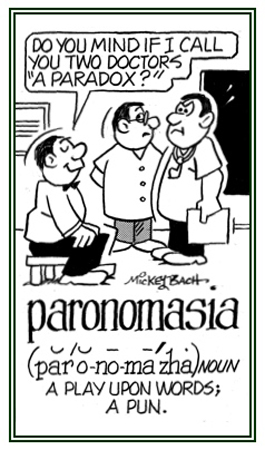You searched for:
“paradox”
1. A statement or belief that is contrary to a received opinion or belief; often with the implication that it is marvellous or incredible: Sometimes a paradox has an unfavorable connotation, as being in a disagreement with what is held to be an established truth, and hence absurd or fantastic; sometimes with a favorable connotation, as a correction of some error.
2. An expression or proposition, which, on the face of it, seems self-contradictory, absurd, or at variance with common sense: After an examination or when explained, a paradox may prove to be well-founded or true.
3. A person, situation, or something that is considered, in itself, to be contradictory to reason or truth: It is a paradox when some computer programs often need special upgrading; especially, since they are supposed to exist in order to save time for users.
4. Etymology: from Latin paradoxum, "paradox, a statement seemingly absurd yet really true"; from Greek paradoxon; a noun use of the neuter of adjective paradoxos, "contrary to expectation, incredible" from para-, "contrary to" + doxa, "opinion"; from dokein, "to appear, to seem, to think".

© ALL rights are reserved.

© ALL rights are reserved.
Go to this Word A Day Revisited Index
2. An expression or proposition, which, on the face of it, seems self-contradictory, absurd, or at variance with common sense: After an examination or when explained, a paradox may prove to be well-founded or true.
3. A person, situation, or something that is considered, in itself, to be contradictory to reason or truth: It is a paradox when some computer programs often need special upgrading; especially, since they are supposed to exist in order to save time for users.
4. Etymology: from Latin paradoxum, "paradox, a statement seemingly absurd yet really true"; from Greek paradoxon; a noun use of the neuter of adjective paradoxos, "contrary to expectation, incredible" from para-, "contrary to" + doxa, "opinion"; from dokein, "to appear, to seem, to think".
The following cartoons present humorous deviations that illustrate that a paradox could be something amusing; such as, two doctors or a pair of docs.


Go to this Word A Day Revisited Index
so you can see more of Mickey Bach's cartoons.
This entry is located in the following units:
dox-, -doxy, dog-, dogma-, dogmato-
(page 2)
para-, par-
(page 4)
